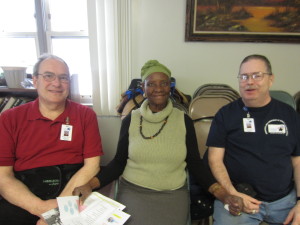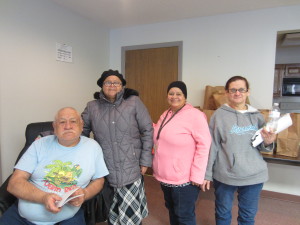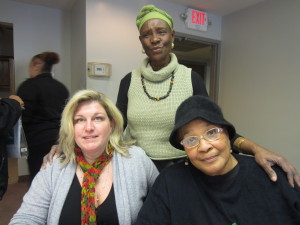Our Residents
SHA residents learn how to handle an emergency
What to do if all the power in your apartment – make that your housing development, your neighborhood or your entire city – suddenly goes off, and stays off?
What if your phone line is dead? And you have no running water?
These potentially frightening scenarios were reviewed recently at an educational session at Morris Apartments, where emergency care experts reviewed some simple tips that can make all the difference during all manner of unforeseen circumstances. The same presentation has been done at Gentile Apartments and Forest Park Manor, to attentive and engaged audiences.

Robert Klupa, Springfield Deputy Commissioner of Health and Human Services Betty Anderson Frederic, and Robert Hackett, helped seniors at Morris Apartments to be ready for emergencies. Klupa and Hackett are volunteers with the Springfield Medical Reserve Corps.
At Morris, Betty Anderson Frederic, deputy commissioner for the Springfield Department of Health and Human Services, posed a few questions to determine how well the elderly and disabled residents are prepared for an emergency.
“How do you get yourself ready to survive a public health emergency or a disaster,” she asked. “If you’ve lived through disasters, you’re a survivor. And you’re in a better position to be prepared for survival.”
Her presentation included some expert tips from Springfield Medical Reserve Corps volunteers Robert Hackett and Robert Klupa, both with years of experience in the medical field and many ideas about how people, especially the elderly, can take steps to stay safe, even in crisis. The men are among 1,500 volunteers in Western Massachusetts, including more than 300 in Springfield, who give their time in hospitals, clinics and other emergency centers.
Frederic emphasized the need for communication during times of emergency that can range from natural disasters like hurricanes and earthquakes to human-generated crises such as house fires and explosions.
“Make a communication plan and write it down – where you will be if something happens, and who needs to know about it. Pick a gathering site and make sure everyone knows where they need to go if there’s a need to evacuate,” Frederic said.
Klupa advised residents to rotate their canned foods so that there will be something fresh to eat if grocery shopping is not an option. Hackett suggested having a manual can opener, and a mini-tool kit, on hand. Frederic offered the idea of having a thin, light blanket that is easily accessible.

Morris Apartments residents Carmello Rivera, Carmen Ramos, Carmen Aponte and Lydia Matel found the session informative and interesting.
Other thoughts shared by the trio:
- Don’t rely on a cell phone, and have a land line phone that is easily accessible.
- Keep needed medicines nearby the bed.
- Have an emergency kit that includes a flashlight, batteries and toiletries.
- Have three days’ worth of food and water available.
- Plan for pets.
- Have solar or wind-up gadgets such as a flashlight and a transistor radio.
- Be sure to own a pair of good shoes, and stay stocked up on items such as duct tape, plastic wrap, matches, toilet paper and soap.
- If an emergency occurs, fill the bathtub with water for flushing toilets, among other uses.
“The first 72 hours in an emergency, you may be on your own,” Frederic noted. “Depending on what’s happening, streets may not be open. No one may be available to come immediately. If you can prepare to survive for 72 hours, you can survive.”
Residents were given ‘Go Kits,’ which included much printed advice, sheets for emergency numbers, a flashlight and a whistle.

SHA Resident Services Coordinator Candra Cripps sits with Morris Apartments resident Carol Watson. Standing behind them is Springfield Deputy Health and Human Services Commissioner Betty Anderson Frederic.
SHA Resident Services Coordinator Candra Cripps organized the series of events, which are aimed at teaching and reminding residents of the importance of being prepared and staying calm, if and when emergency strikes.
“The more you are aware of the things you can do during any kind of emergency, the better off you are. We want our residents to be prepared,” Cripps said.
Resident Carol Watson said that while much of the advice was common sense, it was very helpful to have the opportunity to think, and talk, about what people can do to always be prepared. Emergencies aren’t usually given much thought until they happen, she noted.
“This was very good to get us thinking,” she said. “There was a lot of information, and it really made me think about the things I can do to help myself and my neighbors if something should happen. I’m definitely thinking about it.”







